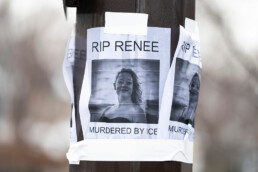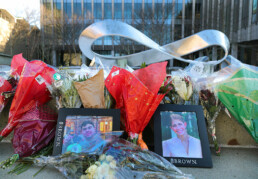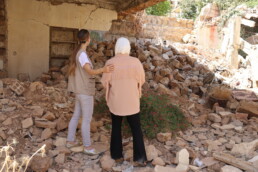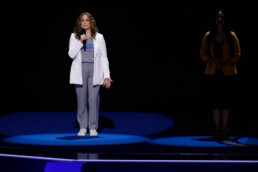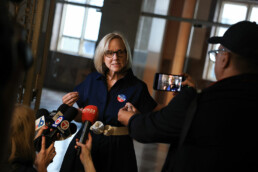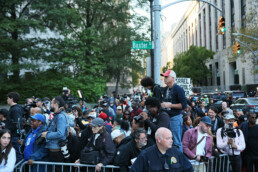Renee Nicole, and Keith, and Marimar, and...
 January 9, 2026 Hey there, Meteor readers, Anyone else already getting impatient waiting for Heated Rivalry, Season Two? We NEED to get back to the cottage.  In today’s newsletter, we look at the story that’s on all our minds today—the murder of Renee Nicole Good—and the long road of violence that preceded it. Plus, a moment of good news for parents, and your weekend reading list. One day at a time, The Meteor Team  WHAT'S GOING ONA growing list of names: Yesterday, a masked ICE agent in Minneapolis shot and killed Renee Nicole Good, who had allegedly been blocking agents from entering her neighborhood. Shortly after the shooting, a Department of Homeland Security spokesperson referred to Good as a “violent rioter” and called the killing an act of self-defense. DHS Secretary Kristi Noem even suggested that Good was part of a group carrying out a “domestic act of terrorism” using vehicles as weapons. But video from the scene shows Good giving way to federal vehicles and trying to respond to conflicting orders from DHS agents, shortly before she was approached and shot through her windshield. Witnesses to the murder have also contradicted DHS’s account of what happened, and video also appears to show ICE preventing medical personnel from nearing the scene. Good’s murder has sparked protests in Minneapolis and calls for investigations into ICE’s tactics. Renee Nicole Good was a parent. Just like Keith Porter, who was shot and killed by an off-duty ICE officer in December for reportedly not complying with an order. Renee Nicole Good had a life, a family, a job. Just like Silverio Villegas Gonzalez, who was shot and killed by ICE agents during a traffic stop in September. Renee Nicole Good was sitting in her car, just like Marimar Martinez, a teaching assistant in Chicago who was shot five times by ICE agents in October. (Miraculously, Martinez survived.) Renee Nicole Good’s community was being terrorized by a violent group of thugs hiding behind masks and the emblem of a federal agency—just like communities in Boyle Heights, Westlake, Santa Ana, Pasadena, and Chicago. And that’s not even to speak of what happens where videos rarely record: In 2025, 32 people died while in ICE custody—the most in more than two decades. Movements in America often gain traction after a horrific event spurs people into action. The violence has to be so profound, so unbearable, or so vividly recorded to shake us from a passive state. But those boiling points are never the first incidents. Patrisse Cullors, Alicia Garza, and Opal Tometi launched Black Lives Matter back in 2013, after the man who killed Trayvon Martin was acquitted—seven years before the murder of George Floyd sparked massive protests across the country. Tarana Burke amplified stories of sexual assault and harassment for more than a decade before reporters exposed Harvey Weinstein’s crimes and MeToo went viral. The question I find myself asking is: Will Renee Nicole Good be the one? Will her murder be the turning point for us to stay in the streets, for judges to intervene, for any lawmaker still waffling to decide “no more”? Or will she blend in with the rest of the violence? A month from now, will we forget her name as we’ve forgotten Keith, Silverio, Marimar, and the dozens of others who never had their moment in the national news spotlight? How much does the body count have to rise for every last person to flood the streets for justice? Because it must be all of us. Our elected leaders are not equipped to take on this task alone. Rep. Ayanna Pressley made her stand and demanded an investigation into the killing of Renee Nicole Good; the GOP blocked it. Former Chicago Mayor Lori Lightfoot is launching an ICE Accountability Project, which is a step in the right direction, and Rep. Robin Kelly is filing articles of impeachment against DHS Secretary Kristi Noem. But between 2015 and 2021, ICE agents were involved in 23 fatal shootings. No agents were indicted. Will this be the year we stop at one? AND:
 A POSTCARD FROM MAMDANISTAN 😘 (VIA GETTY IMAGES)
 WEEKEND READING 📚On history: On the heels of a protester’s violent death at the hands of law enforcement, it might be useful to reread Jill Lepore’s 2020 piece on whether we still recall the lessons learned in blood at Kent State. (The New Yorker) On healing: There are glimmers of hope for the uninsured in America. (The Baffler) On heroes: To celebrate Wyoming’s recent abortion win, here’s a profile of Julie Burkhart, an unstoppable abortion care provider in the state. Even an arsonist burning down her clinic wasn’t enough to slow her down. (The Story Exchange)  FOLLOW THE METEOR Thank you for reading The Meteor! Got this from a friend?
|
![]()
Tears, Joy, and Fear
 January 7, 2026 Salutations, Meteor readers, Happy New Year, friends, it’s good to see you all again. We hope you had a lovely stretch of time off from the real world and are ready to jump back into the massive amounts of everything going on. In today’s newsletter, one of our colleagues shares a personal reflection on what this past week has been like as a Venezuelan living in the United States. Plus, we mourn the loss of a maternal health advocate. Shannon Melero  WHAT'S GOING ON

 I'm Anti-Trump and Venezuelan. This Week Has Been ComplicatedMy heart is celebrating while my brain sees the bigger picture. MADURO AND HIS WIFE ON THEIR WAY TO A FEDERAL COURTHOUSE IN NEW YORK. (VIA GETTY IMAGES) On January 3rd, the U.S. seized Venezuelan President Nicolás Maduro and his wife in a military operation that shocked the world. The reaction from many Americans, who have lived through this playbook before, was outrage. The arrest of Maduro and his arraignment in New York courts has been perceived as an attempted regime change, a violation of international law, and an oil grab—all of which, to be clear, it is. (And there’s probably more madness ahead, given Trump’s comments about how “we need Greenland.”) So what does it all feel like for Venezuelans? After Trump declared that he plans to “run” Venezuela, many are fearing for their safety. At the same time, some Venezuelans in the United States are celebrating the removal of an oppressive dictator from power. For our colleague Bianca—a progressive Venezuelan living in the U.S., who asked that we withhold her last name due to privacy concerns—the moment was quite complex. Here’s what the last few days have been like for her. I'm 100 percent Venezuelan, born in Caracas. I grew up going to El Ávila National Park and the beaches of Margarita Island and just enjoying my country. But when [former president] Hugo Chavez got into power in 1998, the whole country was sort of panicking because of the authoritarian policies. Protests started. Repression and political polarization got gradually worse. Friends and family were put in jail simply for expressing their views. By 2007 or so, media suppression intensified; If The Meteor were in Venezuela, everybody [working here] would be in jail. I was part of the first wave of Venezuelans who left, although much of my family stayed. When I got to Miami in 2001, when I was 21, I totally disconnected from my Venezuelan life. For a decade, I just felt like “I don’t want to deal with this”—kind of what people are doing now in the U.S. It was too much and too painful. Then the 2014 protests happened [sparked by an attempted rape of a student in San Cristobal]. The government was killing students in the streets. That’s when I decided to go to Venezuela with my camera, so I could document the reality of what was happening. Public opinion in the U.S. seemed to frame the student protesters as privileged Republicans. When I started interviewing these students, I discovered that was not true. I met kids from the slums of Venezuela, 15 or 16 years old, narrating their torture incidents in prison. I realized it wasn't a left versus right thing–it was a human rights thing. VENEZUELANS OUTSIDE OF THE UNITED NATIONS OFFICE IN CARACAS DURING THE 2014 PROTESTS. (PHOTO BY BIANCA) These kids were just begging the UN to come help, and they never did. After that, I came back to the U.S. and dedicated myself to social justice. I am a Democrat who is against authoritarian regimes, unfair elections, media censorship, and political repression. I've lost [Venezuelan] friends and family because I was a Bernie supporter, and they cannot believe how I can support Bernie as a socialist [because Chavez and his successor Nicolás Maduro were socialist]. Which was why it felt weird to see Trump’s tweet about how Maduro had been captured. Trump’s tweets usually have a horrible, disgusting effect on my heart, but this is the one time a Trump tweet made me incredibly happy. I woke up my mom and gave her the biggest hug and we both started crying. It finally felt like a little bit of justice. I can see why other left-leaning people in the U.S. are scared that this is going to become another Iraq–especially coming from Trump. I saw what happened with Afghanistan and Iraq, and I was against all of it. But I am disappointed to see my flag being used to push agendas; I’ve seen non-Venezuelan protesters [in the U.S.] with Venezuelan flags holding signs saying “Free Maduro.” And we have been screaming for help for years. Some of the arguments [point out that] this violates international law. Okay, but where was the international law when we were asking the UN to come, or when [Maduro] stole the election from us last year, or when they were massacring kids? Where was the international law when we were asking for so much? BIANCA IN 2014 WITH A PROTESTOR WHO WAS IMPRISONED UNDER THE MADURO REGIME. (PHOTO BY BIANCA) We are in a moment where we have to learn how to hold two opposing truths at once. My heart is celebrating while my brain is carefully thinking through the bigger picture. We deserve this joy after so many years. But there is much more to do to re-establish democracy in my country, and I’d be shocked if Trump were the person to do it. —as told to Nona Willis Aronowitz  FOLLOW THE METEOR Thank you for reading The Meteor! Got this from a friend?
|
![]()
The Essential Stories of the Year
|
Happy holidays, Meteor readers, If we had to pick a single phrase to describe this last year, it would be A LOT. All caps very necessary. A lot happened, a lot changed, and a lot of people lost everything. It was a lot of year. But there was also a lot of great reporting, much of it by women. Despite the attacks on journalists, the doxxing, the name-calling—the “quiet, piggy” of it all—women reporters have been getting it done. So for our final newsletter of 2025, we revisit the pieces that informed us (and the world), changed our perspectives, or even just made us laugh when we really needed it. We’re grateful for the work of our peers and for all of you. (And if you want to support the work we do, it’s easy!) Catch you on the flip, Nona, Cindi, and Shannon  It is no easy task to bring data to life—especially when the state has stopped collecting it. But Andrea Suozzo, Sophie Chou, and Lizzie Presser did exactly that in this essential investigative series, which revealed the extent to which Texas’s abortion ban has increased rates of sepsis and, in some cases, killed women. One of the biggest stories of this year—the arrest and attempted deportation of Palestinian activist Mahmoud Khalil—was broken in March by an all-woman team of students at the Columbia Spectator. Tsehai Alfred, Surina Venkat, Daksha Pillai, Miranda Lu, and Aiyana St. Hilaire not only were the first to report Khalil’s wrongful arrest, they also took their university to task for being complicit in it. The Eyes of Gaza
|
|
![]()
What to Do After a Dark Day
 December 16, 2025 Greetings Meteor readers, I’m typing to you all from beneath a pile of assorted doughs as I made the terrible error of deciding to gift mini cookie boxes this holiday season. Please send help. And more butter if you’ve got it. In today’s newsletter, we look at two polar-opposite responses to similar tragedies, mourn the death of a true feminist, and celebrate the birth of a literary icon. Plus, one year after the end of civil war in Syria, journalist Tara Kangarlou speaks to women who have returned home to rebuild their lives. C is for cookie, Shannon Melero  WHAT'S GOING ONThere’s a better way: This week, on opposite sides of the world, two horrifying acts of violence took place. On Saturday, a gunman killed two people at Brown University. The following day, news broke that two gunmen in Australia had killed 15 people gathered for a Hanukkah celebration at Bondi Beach. This year in America, there were 17 school shootings and 392 mass shooting events. This year in Australia, there was a grand total of one mass shooting event—this one. It’s the country’s first since 2018 and its deadliest in almost three decades. In the hours following the Brown University shooting, the Trump administration circulated misinformation and told reporters, before he even offered condolences, “Things can happen.” Following the Bondi Beach tragedy, the Australian Prime Minister, Anthony Albanese, promised to make the existing gun laws even stricter, saying, “The government is prepared to take whatever action is necessary.” Several new measures have already been proposed by Albanese and other members of his government, including limiting the number of guns an individual can own. Australia has been here before: After that deadly shooting 28 years ago—in Port Arthur—Australia passed some of the strictest gun laws in the world, including a national buyback program. Other countries like Norway, the United Kingdom, and New Zealand (whose prime minister, Jacinda Ardern, explicitly cited Australia as an inspiration) have reacted similarly to mass shootings. But not here—not yet. Granted, there's no panacea for any of this. Gun violence will never be entirely preventable; we know this from basic statistics. Even with its strict laws, Australia had 31 gun homicides last year. But that is .21 percent of the U.S.’s 15,000. In the wake of a very bloody weekend, it’s comforting to remember that some leaders and governments have swift, appropriate responses to horrific violence. And that there's absolutely no reason why we couldn't, too. AND:
 ROB AND MICHELE EARLIER THIS YEAR (VIA GETTY IMAGES)
 MOTHER. (VIA GETTY IMAGES)
 Syria’s Mothers are Fighting to Rebuild Their HomesBY TARA KANGARLOU One year after the end of a long war, they describe what coming home has really been like.KANGARLOU AND LANA, A 35-YEAR-OLD MOTHER FROM SYRIA'S ZABADANI REGION STANDS IN THE RUINS OF WHAT WAS ONCE HER FAMILY HOME. (COURTESY OF KANGARLOU) “There are very few mothers here who haven’t lost a child or a spouse, and very few children who haven’t lost a mother or a wife,” says 62-year-old Khadijah as she sits on the floor of a heavily bombed building—flattened, except for the one room where she now lives with her 75-year-old husband, Khaled. Like most of her neighbors, Khadijah, her husband, and her children—previously displaced across Syria and neighboring Lebanon and Turkey—are now returning to their devastated hometown of Zabadani, wondering how to pick up fragments of a life uprooted. The nearly 13-year war in Syria is known as one of the worst humanitarian crises of the 21st century. According to the United Nations High Commissioner for Refugees, the conflict displaced more than 13 million Syrians, six million of whom fled to neighboring countries. For years, the war functionally dismantled the country’s healthcare and infrastructure and robbed an entire generation of children of their childhood and education—losses that ripple through every fabric of Syrian society today. The UN Human Rights Office has documented over 300,000 civilian deaths, with some estimates approaching half a million. Multiple mass graves have been found across the country, and President Bashar al-Assad’s deployment of chemical weapons in Ghouta and Duma against his own people marked the deadliest use of such agents in decades. This month marks a year since the fall of al-Assad, and over that time, millions of Syrians have been adjusting to their newly liberated reality. More than four million have made their way back to their villages across Syria—their homes reshaped by years of siege, bombardment, and civil war. In Zabadani, Eastern Ghouta, Madaya, Duma, and other hard-hit regions across the country, mothers—like Khadijah—are navigating these losses firsthand as they work to restore a semblance of stability for their families. DESTROYED STRUCTURES SERVE AS DAILY REMINDERS OF CIVIL WAR ACROSS SYRIA. (PHOTO COURTESY OF TARA KANGARLOU) It should be a time of celebration, but for those living among the remnants of destruction, grief is pervasive. “Before the war, I would always wear white, but ever since the first death in our family, I’ve not taken off my black scarf,” Khadijah says. “I continue to be in mourning,”  FOLLOW THE METEOR Thank you for reading The Meteor! Got this from a friend?
|
![]()
Syria's Mothers are Fighting to Rebuild Their Homes
One year after the end of a long war, they tell journalist Tara Kangarlou what coming home has really been like
By Tara Kangarlou
“There are very few mothers here who haven’t lost a child or a spouse, and very few children who haven’t lost a mother or a wife,” says 62-year-old Khadijah as she sits on the floor of a heavily bombed building—flattened, except for the one room where she now lives with her 75-year-old husband, Khaled. Like most of her neighbors, Khadijah, her husband, and her children—previously displaced across Syria and neighboring Lebanon and Turkey—are now returning to their devastated hometown of Zabadani, wondering how to pick up fragments of a life uprooted.
The nearly 13-year-long war in Syria is known as one of the worst humanitarian crises of the 21st century. According to the United Nations High Commissioner for Refugees, the conflict displaced more than 13 million Syrians, including the six million people who fled to neighboring countries. For years, the war functionally dismantled the country’s healthcare and infrastructure and robbed an entire generation of school-aged children of their childhood and education—losses that ripple through every fabric of Syrian society today. The UN Human Rights Office has documented over 300,000 civilian deaths, with some estimates approaching half a million. Multiple mass graves have been found across the country, and Bashar al-Assad’s deployment of chemical weapons in Ghouta and Duma against his own people marked the deadliest use of such agents in decades.
This month marks a year since the fall of Bashar al-Assad, and over that time, millions of Syrians have been adjusting to their newly liberated reality. More than four million have made their way back to their villages across Syria—their homes reshaped by years of siege, bombardment, and civil war. In Zabadani, Eastern Ghouta, Madaya, Duma, and other hard-hit regions across the country, mothers—like Khadijah—are navigating these losses firsthand as they work to restore a semblance of stability for their families.
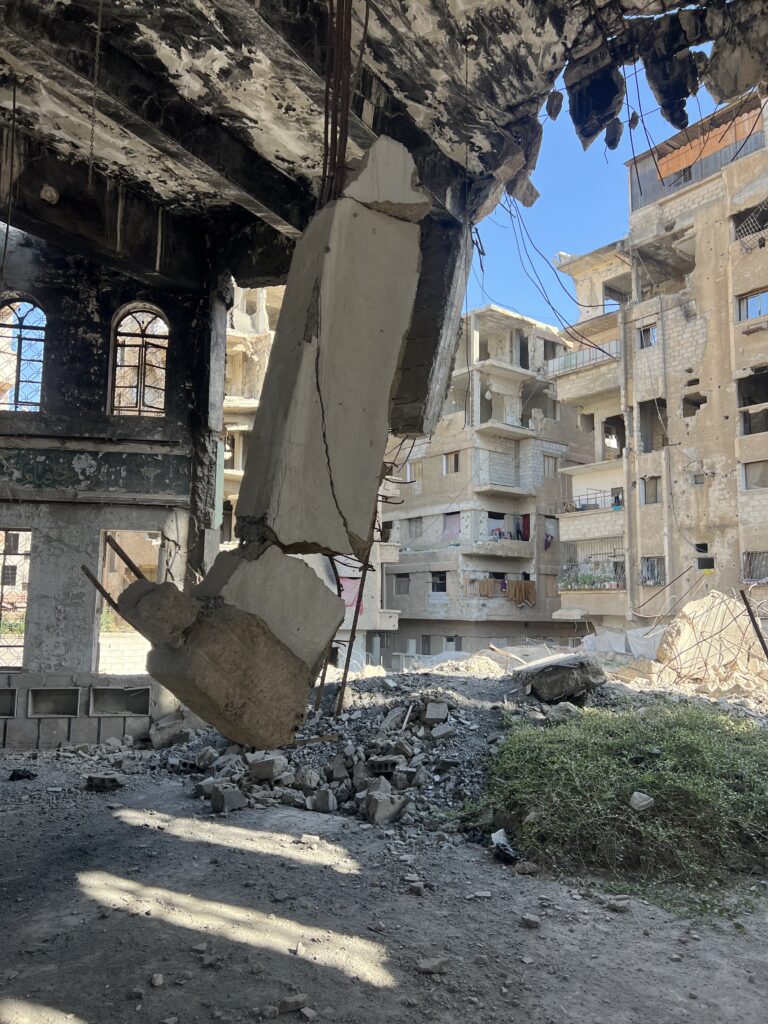
It should be a time of celebration, but for those living among the remnants of destruction, grief is pervasive. “Before the war, I would always wear white, but ever since the first death in our family, I’ve not taken off my black scarf,” Khadijah says. “I continue to be in mourning,”
Like so many others in Syria’s Zabadani region, Khadijah and her family hail from generations of experienced, hard-working farmers. But the land, once celebrated for its apple orchards, vineyards, and lush farmland that helped feed Damascus, endured one of Syria’s longest and most punishing sieges. Between 2015 and 2017, barrel bombs, airstrikes, and artillery shells rained down, destroying irrigation systems, flattening farmland, and contaminating the earth with heavy metals, TNT, and fuel residues. The blockade also choked off agricultural inputs—seeds, fertilizers, and clean water, leading to the collapse of a once-thriving rural economy.
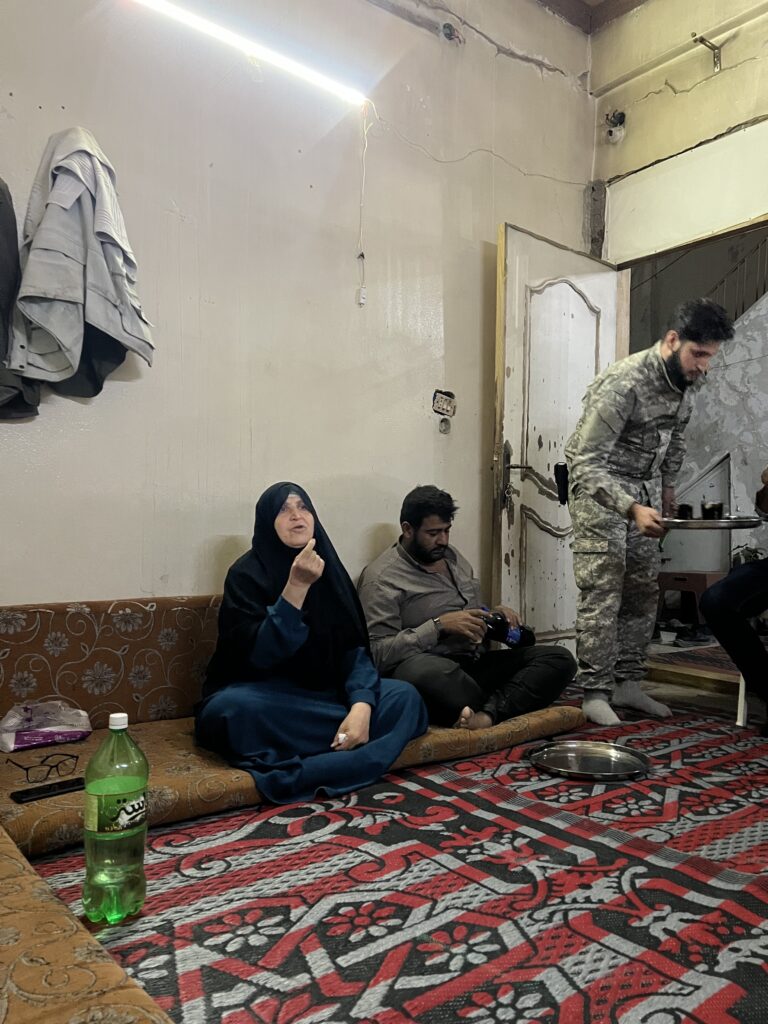
“We’d feed an entire town with our fruits and vegetables, but now, we barely have enough to feed our own family,” says Khadijah, whose grievances are evident when you visit her farm, where the soil is depleted and infrastructure destroyed.
“The only people whose farmland was spared were the people who cooperated with the Assad regime,” Khadijah explains. “We’re grateful to be alive, and we will rebuild, even though right now, we just don’t know how.” Later, she recalls the harrowing days in 2015 when she, her two daughters, and her then two-year-old grandson, Ammar, were displaced to nearby Madaya as the Assad army besieged Zabadani. Soon, those under siege in Madaya were facing severe food shortages and starvation under a blockade imposed by Assad’s forces and his allies Russia and Iran-backed Hezbollah.
“Ammar’s father [my son-in-law] was just killed…when we were forcefully moved to Madaya,” she says. “We had so much grief. “For the nearly two years that followed, we had nothing to survive on except rationed sugar, bread, and at times animal feed and grass.”
It wasn’t until 2017, following months of siege, that Khadijah and her family were relocated to opposition-held Idlib where they continued to live in displacement with little means to support the family.
Now 22, Ammar is studying to be a medical technician in Idlib—a city that remained the only lifeline for hundreds of thousands of displaced Syrians during the war. Visiting his grandparents in Zabadani, he brings in freshly made Arabic coffee and sits next to his grandmother and 37-year-old uncle Omar, who lost an eye in the war. Both men look at Khadijah with deep respect and endearment. “Every single mother in Syria has suffered tremendously, including my own mother and my grandmother; but we are of this land, and we’re happy to be back,” said Ammar.
The Flowers Still Bloom
Across Syria, the devastating impact of warfare is as environmental as it is emotional.
Just an hour’s drive from Damascus, 35-year-old Hiba walks through her hometown of Duma in Eastern Ghouta, stopping at a perfume shop to buy rose-scented oils—a defiant joy after surviving years of siege, bombardment, and chemical attacks. “Everything above ground was destroyed,” she says, recalling giving birth during the war in a half-collapsed clinic with no medicine, water, or electricity. Today, Hiba calls her 7-year-old daughter, Sally, her best friend and the person who makes life meaningful. “She loves riding her scooter and wants to be a pharmacist,” Hiba shares.
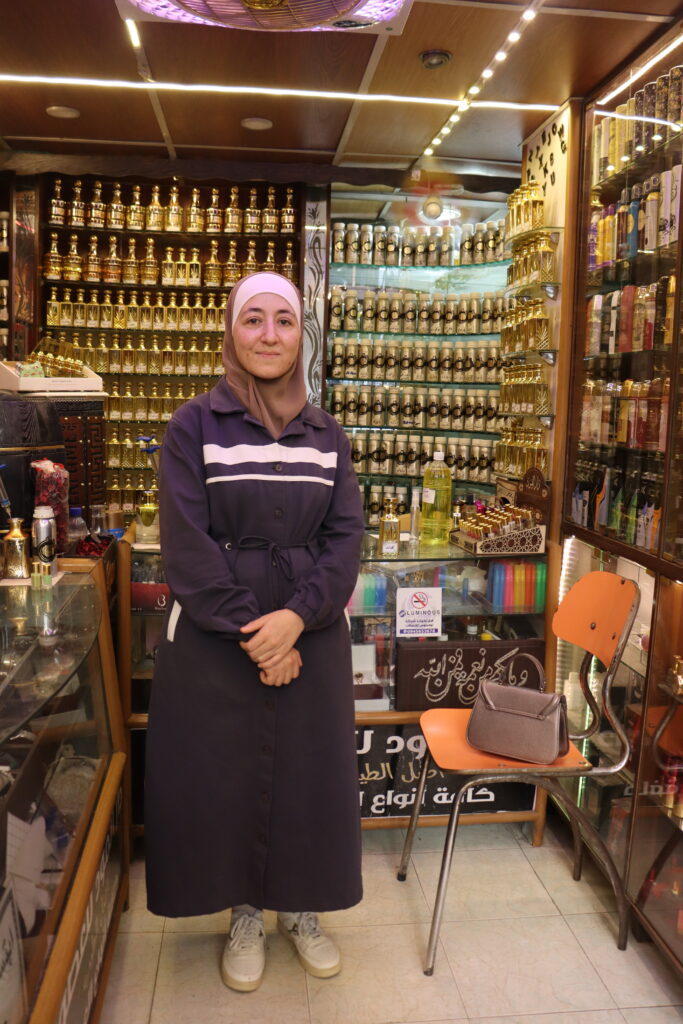
During the war, inspired by her family’s struggles caring for her younger brother with Down syndrome, Hiba began working with children with special needs—a profession she continues to this day, despite her own personal battles.
“People were disconnected from the world,” she says, pointing to what once was her house—a collapsed building lying under the weight of repeated barrel bombs and artillery strikes. “Our country is destroyed, but we mustn’t forget what happened to us. Our children must remember everything—so it doesn’t happen again.”
Both Zabadani and the Eastern Ghouta regions stand as stark evidence of how siege warfare and chemical weapons became tools of collective punishment—obliterating not just lives, but the ecosystems and livelihoods that sustained millions of ordinary civilians, including mothers, who are now searching for hope amidst rubble.
Back in Zabadani, 35-year-old Lana—a mother of two toddler boys—walks the grounds of her grandfather’s house and what was once her safe haven as a child.. She is a psychologist who has recently returned to her flattened town after years of life as a refugee in Lebanon. Today, along with her husband, she’s back “home,” doing what she once dreamed of doing for her own people and community.
“This is my grandfather’s home. My daddy grew up here,” she says. “We used to play here as children.”
The building’s walls are pocked with shrapnel holes and its ceilings blown down into rubble, but as we climb up and walk into the remnants of the house, she suddenly turns around, tearing up. On a half-collapsed wall, a faint drawing survives—painted decades ago by Lana’s father as a child, and depicting a red house surrounded by trees and a bright blue lake—the last fragile trace of a family’s life before war.
“My daddy was an artist. I have to tell him this is still here.” She looks at the flowers growing from underneath a pile of stones and smiles: “See, even in the middle of this destruction, we still have flowers bloom. There is hope, Tara. We are here.”
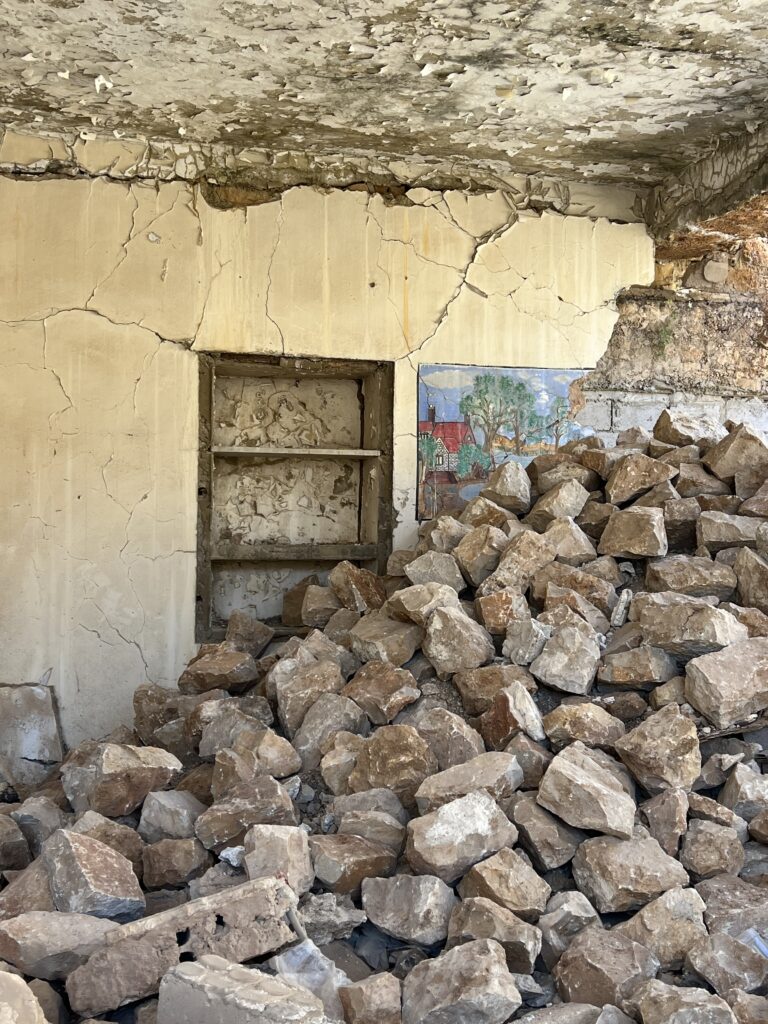

Tara Kangarlou is an award-winning Iranian-American global affairs journalist who has produced, written, and reported for NBC-LA, CNN, CNN International, and Al Jazeera America. She is the author of The Heartbeat of Iran, an Adjunct Professor at Georgetown University, and founder of the NGO Art of Hope.
Three Questions About…Gun Safety
Thirteen years after the Sandy Hook tragedy, survivor Abbey Clements reflects on creating a gun safety organization “for teachers by teachers.”
By Ann Vettikkal
For more than a decade after elementary school teacher Abbey Clements survived the Sandy Hook mass shooting—during which she protected and distracted her students from the gunshots thundering through the school—she worked overtime. During the weekdays, she continued to teach second grade in Newtown, Connecticut. And in her off hours, she was a fierce advocate in the movement to end gun violence. Clements trained volunteers, planned vigils, and found creative ways to engage people on the issue. “I was waiting for an educator-focused group to emerge,” Clements said, “and it just wasn't happening.”
The last straw was November 30, 2021, when a school shooting at Oxford High School in Oxford Township, Michigan, took the lives of four students. Clements remembers expressing frustration in a group chat with Sarah Lerner, a teacher who survived the Marjory Stoneman Douglas mass shooting in Florida, and Sari Beth Rosenberg, an educator and activist in New York City. The three went on to found Teachers Unify, an organization “for teachers by teachers” that aims to involve educators in the demand for national gun safety. We talked to Clements about what she’s doing—and what needs to change.
The 13th anniversary of Sandy Hook is this weekend. How has the movement to end gun violence changed since the Sandy Hook tragedy?
What's changed the most is that many factions of our society have come together to raise their voice on this issue. You see people coming up from the medical field. You see clergy bonding together, speaking out about this. [You see] organizing by students….What hasn't changed, or what perhaps has gotten worse, is we've identified that guns are the leading cause of death for children in America. So, although we've seen lots of different factions of our society stepping up, we haven't seen [the] legislation, and culture change, that we need. Data clearly shows that states with common sense legislation have fewer gun tragedies, [but we also] know that legislation alone won’t end this public health crisis. An estimated 4.6 million children live in homes with at least one loaded, unlocked firearm, and we also know that about three-fourths of school shooters get their gun from home or from a family member or relative. A culture shift could save so many lives.
What work is Teachers Unify focusing on right now?
Teachers are among the most trusted voices, according to a 2025 Gallup poll, just under nurses. But in terms of policy and what's best for kids, our voices just haven't been included in the conversation…The second graders who endured the tragedy with me are now college students, and they're watching these shootings happen over and over again, and I refuse to give up on them. Teachers have so much to offer on this issue. We just haven't been intentionally brought into the movement until now. And so the mission of Teachers Unify is to empower educators to demand that communities are safe from gun violence, and that first step is for us to see ourselves as the experts we are.
We know what's best for kids. We were trained. [That’s why we need to get] a seat at the table for these vital conversations. That looks like presenting at conferences and panels across the country, and we just launched an unprecedented crisis intervention and support team. [This is a team of] school shooting survivors and clinicians who have lived experience responding to communities after gun violence. [They] can come into school communities, and really work with the staff to help them move forward.
What are some things people can do to support these efforts?
People can encourage their school leaders, their kids, school officials, administrators, superintendents, town officials to send secure firearm storage information home with kids from school. There are a few states doing this, but this is, unfortunately, not common practice, because this issue is seen as partisan when it is a public health crisis. So parents and allies can help start that conversation through their PTAs. The National PTA is a big supporter of secure firearms storage, and I feel like this is our biggest chance for widespread change, if we could normalize education around this and get the schools to send out periodic reminders, especially during the holidays.
This interview has been condensed and edited.
A Blue Sky in Miami
 December 11, 2025 Salutations, Meteor readers, I have chosen to join the cult of Scott Hunter. I will not be taking any questions at this time. Please tell my family I’ll miss them.  In today’s newsletter, we unpack a historic mayoral victory in Miami. Plus, a discussion on the never-ending fight to end gun violence with a teacher who survived Sandy Hook. 🏒♥️, Shannon Melero  WHAT'S GOING ONWelcome to (blue) Miami: This week, the city of Miami elected its first woman mayor, and to the shock of all the Brickell girlies—the new mayor is a Democrat. Eileen Higgins, a moderate in a recently Trump-y city, is the first blue mayor Miami has seen since the late ‘90s. Higgins was up against a Trump-backed candidate in the president’s favorite state and still secured nearly 60 percent of the vote. And, much like the election of Zohran Mamdani in New York, this mayoral victory feels like part of a bigger trend. The mayor-elect herself agrees. People are paying close attention to mayoral races because “local government is where real change happens,” Higgins writes The Meteor in an email. It’s “where leaders can cut through dysfunction and improve daily life in measurable ways.” Amanda Litman, cofounder and executive director of Run for Something, sees Higgins’ win as a direct response to federal chaos: “When national politics feels noisy or gridlocked, voters look to the leaders who can get things done, and mayors can,” she says.  YOU CAN'T MESS WITH SOMEONE WITH A BOB THIS SHARP. (VIA GETTY IMAGES) And of course, there’s the idea that these mayoral races are a sign of things to come. Higgins’ election “shows that momentum is on Democrats’ side,” explains A’shanti Gholar, president of Emerge America. “She spoke to [voters] about their basic needs, what they want for themselves and their families,” rather than focusing on the opposition. Higgins has a history of attracting a wide range of voters; she was a commissioner for Republican-leaning Miami-Dade County. “When you focus on delivering results on issues like affordability, transit, public safety, and flooding,” Higgins tells The Meteor, “voters will cross party lines.” The GOP, unsurprisingly, tried to downplay the larger significance of Higgins’ win. “It’s not a rebuke of the president or the party,” Miami-Dade County Chair Kevin Cooper told reporters. “Democratic city elects Democratic mayor.” The numbers tell a different story about that “Democratic city.” According to this year’s voter registration information, of the more than one million people registered to vote in Miami-Dade County, a combined 450,000 are registered with the Conservative Party of Florida and the Republican Party of Florida—significantly more than the 407,000 registered Democrats. But while Miami may be increasingly red (and helped elect Trump last year), it also has a large immigrant population and has been a key target of ICE. Higgins has acknowledged immigrants’ fear, and has spoken out against the administration’s policies, calling them “trickle-down hatred” and “inhumane.” Her victory shows buyer’s remorse may be finally kicking in. “The immigrant communities that voted for Trump [are feeling like] ‘This guy played us,’” Gholar says. (Twice bitten, thrice shy is the saying, right?) For Democrats and anyone interested in running for office, Litman sees a clear lesson: “Nothing in politics is predetermined. The map isn’t fixed. When Democrats invest early, recruit great candidates, and build local infrastructure, we can compete anywhere.” AND:
 Three Questions About...Gun SafetyThirteen years after the Sandy Hook tragedy, survivor Abbey Clements reflects on creating a gun safety organization “for teachers by teachers.”BY ANN VETTIKKAL  CLEMENTS APPEARED AT THE 2024 DNC WITH OTHER SURVIVORS OF SCHOOL SHOOTINGS. (VIA GETTY IMAGES) For more than a decade after elementary school teacher Abbey Clements survived the Sandy Hook mass shooting—during which she protected and distracted her students from the gunshots thundering through the school—she worked overtime. During the weekdays, she continued to teach second grade in Newtown, Connecticut. And in her off hours, she was a fierce advocate in the movement to end gun violence. Clements trained volunteers, planned vigils, and found creative ways to engage people on the issue. “I was waiting for an educator-focused group to emerge,” Clements said, “and it just wasn't happening.” The last straw was November 30, 2021, when a school shooting at Oxford High School in Oxford Township, Michigan, took the lives of four students. Clements remembers expressing frustration in a group chat with Sarah Lerner, a teacher who survived the Marjory Stoneman Douglas mass shooting in Florida, and Sari Beth Rosenberg, an educator and activist in New York City. The three went on to found Teachers Unify, an organization “for teachers by teachers” that aims to involve educators in the demand for national gun safety. We talked to Clements about what she’s doing—and what needs to change. The 13th anniversary of Sandy Hook is this weekend. How has the movement to end gun violence changed since the Sandy Hook tragedy? What's changed the most is that many factions of our society have come together to raise their voice on this issue. You see people coming up from the medical field. You see clergy bonding together, speaking out about this. [You see] organizing by students….What hasn't changed, or what perhaps has gotten worse, is we've identified that guns are the leading cause of death for children in America. So, although we've seen lots of different factions of our society stepping up, we haven't seen [the] legislation, and culture change, that we need. Data clearly shows that states with common sense legislation have fewer gun tragedies, [but we also] know that legislation alone won’t end this public health crisis. An estimated 4.6 million children live in homes with at least one loaded, unlocked firearm, and we also know that about three-fourths of school shooters get their gun from home or from a family member or relative. A culture shift could save so many lives. What work is Teachers Unify focusing on right now? Teachers are among the most trusted voices, according to a 2025 Gallup poll, just under nurses. But in terms of policy and what's best for kids, our voices just haven't been included in the conversation…The second graders who endured the tragedy with me are now college students, and they're watching these shootings happen over and over again, and I refuse to give up on them. Teachers have so much to offer on this issue. We just haven't been intentionally brought into the movement until now. And so the mission of Teachers Unify is to empower educators to demand that communities are safe from gun violence, and that first step is for us to see ourselves as the experts we are. We know what's best for kids. We were trained. [That’s why we need to get] a seat at the table for these vital conversations. That looks like presenting at conferences and panels across the country, and we just launched an unprecedented crisis intervention and support team. [This is a team of] school shooting survivors and clinicians who have lived experience responding to communities after gun violence. [They] can come into school communities, and really work with the staff to help them move forward. What are some things people can do to support these efforts? People can encourage their school leaders, their kids, school officials, administrators, superintendents, town officials to send secure firearm storage information home with kids from school. There are a few states doing this, but this is, unfortunately, not common practice, because this issue is seen as partisan when it is a public health crisis. So parents and allies can help start that conversation through their PTAs. The National PTA is a big supporter of secure firearms storage, and I feel like this is our biggest chance for widespread change, if we could normalize education around this and get the schools to send out periodic reminders, especially during the holidays. This interview has been condensed and edited.  WEEKEND READING 📚On gender roles: Being “manly” won’t get men what they want out of life. (Vox) On being iconic: A’ja. Wilson. (TIME) On sleigh bells: How heteros hijacked the holidays. (Dire Straights Podcast)  FOLLOW THE METEOR Thank you for reading The Meteor! Got this from a friend?
|
![]()
Mind the "Ambition Gap"
 December 9, 2025 Greetings, Meteor readers, Guess who’s back? In today’s newsletter, a new report on women in the workplace puts data behind the bad office vibes. Plus, the best Nativity scene of the year. Ohmahgod we’re back agaaiinnn, Nona and Shannon  WHAT'S GOING ONNew gap, who this?: A recent report conducted by McKinsey and Lean In found that this year, women in corporate America faced a number of setbacks, which, for anyone paying attention to the post-pandemic economy, isn’t all that surprising. But what is notable is what the researchers call a new “ambition gap” between men and women. According to the study, although both groups are “equally dedicated to their careers” and the vast majority of women—80 percent!—do want to advance, women are about 7 to 8 percent less likely to want a promotion at the entry, mid, and senior levels compared to men in the same positions. (Interestingly, Latinx women reported a desire to advance more than any other group of women.) This is quite a departure from just two years ago, when the same study determined that women were equally as interested in promotion as men. So what’s changed? Well, it may be more about what hasn’t changed.  While women want to perform well at work, the survey hints, they’re losing the appetite for fighting an uphill battle. The report highlights that women are being held back by a lack of support from colleagues, bosses, and mentors, all of which creates a “steeper path forward” in advancement. The study also found a familiar culprit: caregiving and other out-of-work responsibilities. Almost a quarter of women uninterested in promotion responded that “personal obligations make it hard to take on additional work.” (An increase in return-to-office requirements makes it even harder to balance home life.) The steep decline in DEI initiatives hasn’t helped matters, either; a dismaying chart in the study shows that only 54 percent of HR employees surveyed said that their companies considered women’s career advancement a priority—way, way down from 88 percent in 2017. These changes lend hard data to a recent shift in culture. As Axios points out, the rise of “tradwife” content—which idealizes the trope of straight, married women not working outside the home—as well as pundits contemplating whether women are ruining the workplace, has awoken the catnapping giant of corporate misogyny. There is also a touch of generational tension at play: Women under 30 at the entry level (Gen Z and the youngest millennials) are more interested in being promoted than women over 40. “The drop in ambition appears to be fueled in part by the limited career support older entry-level women receive,” the report notes. Perhaps if career support extended to relieving midlife women of their outsized domestic responsibilities (here’s an idea!), their ambitions wouldn’t be dropping through the floor. Or call us crazy, but just maybe the current corporate models that have gone largely unchanged for decades are designed to keep women (especially caregivers) out, and women are tired of playing a losing game. Who knows? (This gal.) It’s been a long, hard year for independent media. Many traditional media companies are shrinking—in courage and conviction. But at The Meteor, our team is energized to keep digging into the issues that affect your life, and bringing you the coverage and community you want. And we need your support to do it! We have three weeks left in our Winter 2025 impact campaign for The Meteor Fund, The Meteor’s non-profit initiative, which supports woman-centered storytelling and community building. If you’re inclined to give, please do! And please share with anyone you know who loves independent media. AND:
 SHE IS THE AWARD. (VIA GETTY IMAGES)
 HOW SHE'S GOING TO BE LOOKING AT JESS BERMAN ON HER WAY TO CHELSEA. (VIA GETTY)
 FOLLOW THE METEOR Thank you for reading The Meteor! Got this from a friend?
|
![]()
A Major University "Bending the Knee"
 December 4, 2025 Greetings, Meteor readers, I got called ma’am today. Someone get me the number for Anne Hathaway’s Botox guy. In today’s newsletter, the editor-in-chief of one of the two magazines shut down by the University of Alabama speaks out. Plus, somehow, 2026 already has a color of the year. It’s not great. Spotify says I'm only 27, Shannon Melero  WHAT'S GOING ONRoll(back) Tide: “We’re all really confused,” Gabrielle Gunter tells me, audibly exasperated. Gunter, a grad student at the University of Alabama, has had an unusually long week, and it’s not just because she’s preparing for finals. On Monday, Gunter and the staff members of the university’s student media department gathered and were told that two of four university-run publications would be suspended. Alice, the women’s magazine where Gunter was editor-in-chief, and Nineteen Fifty-Six, a Black culture and student life magazine, were getting the axe. The reason for the publications’ suspension? The university’s decision to comply with a July anti-DEI memo from U.S. Attorney General Pam Bondi. But to understand how a memo cost Gunter her job, you’ve got to go backwards a bit. Last summer, the state of Alabama passed SB 129, which prohibits state institutions from sponsoring DEI programs or offices. University of Alabama was obligated to follow suit and did so, removing offices of the Black Student Union and LGBTQ+ support groups. Gunter was under the impression that student publications were safe from SB 129 because of First Amendment protections. But the Bondi memo skirts around those protections by listing vague “best practices” for implementing DEI rollbacks. One of the conditions listed is “unlawful proxy discrimination,” a term used in the meeting on Monday when students were being told about their magazine suspensions. “I’m devastated but, regrettably, not surprised by the [university’s] decision to suspend Nineteen Fifty-Six,” the magazine’s editor in chief Kendal Wright, wrote in a statement. “Regardless of our suspension, there will continue to be a need…for the stories of the university’s Black community to be told.”  RECENT COVERS OF NINETEEN FIFTY-SIX. BACK ISSUES WILL STILL BE AVAILABLE AS AN ARCHIVE, THE UNIVERSITY TOLD STUDENTS. (SCREENSHOT VIA NINETEEN FIFTY-SIX) “They’re not suspending us based on content; they’re doing it based on our target audience,” Gunter explains. Like all publications (including this one!), Alice and Nineteen Fifty-Six cater to specific groups while still maintaining equal opportunity hiring practices. Anyone can read these magazines. But, under Bondi’s “unlawful proxy” guidance, the fact that they are designed to appeal to women and Black students is considered a “divisive” implementation of DEI—or at least that is how the Trump administration has chosen to define it, and what UA is adhering to in defense of its funding. (It’s worth noting here that the athletic program at Alabama alone brings in over $200 million in revenue for the school. The cost to operate Alice is somewhere in the neighborhood of $10,000.) But surely, if the university is doing all of this, there must be some external pressure from the government to comply, right? Gunter doesn’t believe this is the case. She explains that the school’s newspaper, The Crimson White, “hasn’t found anything that indicates that there was pressure from the Board of Trustees or legislators in Alabama” to eliminate the magazines. “They’re bending the knee to the government,” Gunter says. “I think the [slow rollback of diversity groups] allowed for a rise of conservatism and fascism on our campus.” Gunter adds that despite the university’s racist history, changes have been made over the years to make the campus more inclusive, such as student identity groups, the UA Safe Zone, and, of course, Nineteen Fifty-Six, which published its first issue in 2020 and was titled after the year the first Black student, Autherine Lucy Foster, was allowed to enroll at UA. Much of that progress, she believes, is now being undone.  RECENT ISSUES OF ALICE, WHICH WILL ALSO REMAIN AVAILABLE AS AN ARCHIVE. GUNTER SAYS THE UNIVERSITY HAS NOT CLARIFIED WHEN HER STAFF WILL LOSE ACCESS TO THE WEBSITE. (SCREENSHOT VIA ALICE) In May, the university’s Women and Gender Resource Center was renamed (per SB 129 rules) the “Camellia Center.” According to an accountability group formed by UA alumni and former staff, Break the Cycle Collective, the school also dissolved the Summersell Library, a collection located in Camellia, and “forbade” staff from announcing the closure to the campus community. (The Meteor reached out to the University of Alabama about this closure and did not receive a response before publication.) The center and the library both provide resources for anyone recovering from interpersonal violence and were originally founded to “promote women’s inclusion" on campus. “Even though women are the majority on campus, we’re still a marginalized group,” Gunter says. When you put all of the pieces together—the rollbacks, the closures, the timing of the magazine suspension right ahead of finals when students are busiest—you get a concerning image of a nationally renowned university trying to silence its students. Gunter says that many student journalists she knows, both on Alice and Nineteen Fifty-Six, fear retaliation for speaking to outside press, even though they have been told there won’t be any. I asked why they were concerned. “It’s the University of Alabama,” she said matter-of-factly. “We know that famous public universities like this have an image they want to spread, and when you come out and say this university shut down these two publications that highlighted marginalized voices, it looks bad for them. I have two jobs on campus…and it's very scary to think that the way I pay my bills could be taken from me.” Other student organizations have planned a demonstration on campus today (Alice and Nineteen Fifty-Six are not official organizers because of their suspended status) to demand that the university reinstate both magazines, and a petition is being presented to UA’s president, Dr. Peter J. Mohler. On Monday, staff members for the shuttered magazines were told they could start a new magazine that catered to “all student identities.” Gunter wasn’t a huge fan of the idea. “I don't like the implication that our magazines weren't for everyone.” AND:
 FOLLOW THE METEOR Thank you for reading The Meteor! Got this from a friend?
|
![]()
Who is the Diddy Doc For?
 December 2, 2025 Hey there, Meteor readers, Good evening to everyone except the casting directors of Chicago, who have chosen to put Whitney Leavitt on Broadway. May the ghost of Gwen Verdon haunt you forever.  In today’s newsletter, we wonder what’s to be gained from the Netflix docu-series about the rise and fall of Sean Combs. Plus, a quick suggestion on where to send some support this Giving Tuesday. Shannon Melero  WHAT'S GOING ONThe Diddy doc: Tonight, you may be partaking in the ancient practice of scrolling through Netflix to find something to watch, and it’s more than likely that you’ll immediately be met with the cover art for a new docuseries: Sean Combs: The Reckoning, which premiered today. But what is it really hoping to achieve, and who is it actually serving? As the title suggests, the series is about Combs, who was convicted of “transportation for the purposes of prostitution” earlier this year (he was acquitted of sex trafficking and racketeering). The four episodes follow his career and track the allegations and rumors that surrounded him even as a teenager—including delving into the theory that he was involved in the death of Tupac Shakur (the doc does make clear that official charges were never brought against Combs). The major selling point of the doc is hours of exclusive videos from the days leading up to his arrest, acquired by Curtis “50 Cent” Jackson, who is an executive producer on the series. Here is where things get complicated. Jackson is a known grudge-holder who has loudly and proudly taken revenge on his perceived enemies. (He once bought 200 tickets to a Ja Rule concert so that the first four rows of the show would be completely empty.) It just so happens that Combs and Jackson have been feuding with each other since 2006, which calls into question the narrative that The Reckoning is really driving. Is this a series, in the vein of Surviving R. Kelly or On the Record, in which victims are centered and telling their stories, or is this Jackson’s final move in a long game played against Combs? Watching Jackson gleefully recount his favorite footage from the series in a recent interview with Robin Roberts leads us to believe it’s the latter. “If I didn’t say anything, you would take it as hip hop was accepting this behavior,” Jackson tells Roberts, responding to the idea that this doc is a product of his disdain for Combs. “No one would be saying anything.” No one? In truth, women in the music industry have been pointing a finger at Combs for years. Some of them, including Aubrey O'Day, appear in the doc, which is largely narrated by the men who surrounded Combs. But making note of that wouldn’t serve the hero narrative Jackson is creating for himself. He’s also claimed that the proceeds of the documentary will go to victims of sexual assault—although how exactly that will happen is unclear.  DANITY KAINE, THE GIRL GROUP FORMED BY SEAN COMBS. O'DAY (SECOND FROM RIGHT) CLAIMS IN THE DOCUMENTARY SHE WAS RELEASED FROM THE BAND FOR REFUSING TO "PARTICIPATE SEXUALLY" WITH COMBS. (VIA GETTY IMAGES) We certainly can’t tell you what to take from this series; we will all walk away with something different. Much of what I watched felt like a round-up of Combs’ enablers clearing their conscience and offering a historic deep dive into the concept of “Diddy” rather than a victim-focused project. But there are a few questions we can all consider before pressing play. Do victims stand to gain anything from it? Will it persuade fans to take Diddy’s reported crimes (and the people they harmed) more seriously? Or is it finally time to give Sean Combs the one thing that would hurt him most: a slow, painful fade to anonymity? Only time and the ratings will tell. THIS GIVING TUESDAY, WE NEED YOUR SUPPORTWe’re writing to you on #GivingTuesday, a day when we give some special love to The Meteor Fund, our affiliated nonprofit, which supports our storytelling about women’s lives, and helps us create community and conversation with all of you. We’re now at a pivotal moment. Many traditional media companies are shrinking—in courage and conviction. Even as everyday Americans are standing up for their rights and the rights of others, too many news outlets aren’t interested in keeping pace. But at The Meteor, we’re energized—and mobilized. We’re expanding our coverage, forging partnerships with other independent outlets, and taking our trademark events on the road. Will you support The Meteor Fund this year, and join us as we grow? Your tax-deductible donation (little or large!) will help The Meteor Fund expand our work in the months ahead. AND:
 WOMEN AND CHILDREN ARRIVING IN DULLES AIRPORT IN 2021 AFTER BEING EVACUATED FROM KABUL. (VIA GETTY IMAGES)
 FOLLOW THE METEOR Thank you for reading The Meteor! Got this from a friend?
|
![]()
